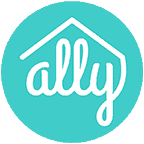Background: Navigating complex safety challenges
At Meifod & Vicarage Court, safety posed challenges for dementia care across three floors, where residents’ night-time behaviours, including wandering and agitation, required special attention. “We needed a way to monitor residents without disrupting their rest while still being able to respond quickly to those in need,” explained Nazmeen, the Home’s Responsible Individual (RI). With limited night staff and sensor mats proving unreliable, incidents like falls sometimes went undetected, affecting resident safety and staff response capabilities. The team sought a discreet yet effective solution to improve safety without intrusive monitoring or excessive room checks.
Choosing Ally: A safety & privacy-first approach
Nazmeen discovered Ally in 2020 and was drawn to its remote monitoring capabilities, which prevent constant, disruptive room checks. “I looked into other options, but Ally stood out for its innovative, person-centred approach, and I liked that it was a UK-based company,” she explained. Unlike sensor mats, Ally’s sound and motion detection allowed staff to observe residents remotely, preserving their privacy. This feature has proven invaluable for residents needing extra night-time support, such as those with a high risk of falls.
Overcoming initial implementation challenges
Integrating Ally required some adaptations due to the building’s older structure. The team also worked closely with families to address privacy concerns. “When families saw the Ally system in action, they were relieved to know their loved ones were cared for in a way that respected their dignity,” Nazmeen recalled. Some families, initially requesting cameras, felt assured by Ally’s non-intrusive monitoring.
Staff training was another critical component. “Kyle’s training was among the best we’ve had—staff felt reassured and were able to ask questions openly,” noted Gemma Jones, Care Home Manager. This support allowed caregivers to interpret alerts confidently, resulting in a smoother transition and increasing staff trust in the system’s benefits.
Fostering cultural change and trust in technology
Beyond operational changes, introducing Ally represented a cultural shift. Initially, staff were cautious, fearing increased device usage might distract from resident interactions. However, the system soon demonstrated its positive impact by providing real-time data and reducing paperwork, allowing caregivers to focus more on residents’ needs. “It allowed us to be more responsive to residents’ individual needs, improving our human connection by alerting us exactly when we were needed,” Gemma shared. The system’s adaptability fostered trust among staff, empowering them to monitor residents more effectively without compromising personal care.
Improving resident well-being and reducing falls
One of Ally’s most significant impacts has been on resident wellbeing. The system enabled a move away from routine two-hourly night checks to tailored alerts, reducing night-time disruptions. “We’ve seen a massive reduction in falls because residents are getting a better night’s sleep,” said Gemma. Improved sleep has led to residents being more alert during the day, interacting more, and eating better. In the first three months using Ally, falls reduced by 37%, with fewer night and daytime falls due to improved rest. Nazmeen added, “Instead of relying on weeks of paper-based sleep diaries, we can now quickly extract data to share with doctors, giving us a clearer picture of each resident’s needs.”
Enhanced managerial oversight and efficiency
In addition to improving resident care, Ally has streamlined managerial responsibilities. “Before Ally, it was difficult to stay updated on night staff’s activities. Now, I can log on from home, see who’s active, and confirm tasks are being completed,” Gemma shared. This remote access provides a new level of oversight without the need for physical checks. Ally’s real-time data supports regulatory compliance, offering valuable insights for inquests or external reviews and enhancing the home’s credibility.
Positive feedback from families and staff
Feedback on Ally has been overwhelmingly positive from all parties. “It’s reassuring because you know that your home is safe, and if anything is happening, you can log on and check immediately,” said Gemma. Families expressed appreciation for Ally’s role in maintaining resident safety, while staff found their work more manageable with streamlined monitoring and real-time data, enabling more personalised care.
Business benefits of Ally
While it is early to measure the full impact on occupancy and staffing costs, Ally offers a distinct competitive advantage. Nazmeen believes this monitoring system, uncommon in local care homes, could attract families with high-dependency residents. Ally’s insights also help optimise staffing by identifying patterns in resident dependency, allowing for a more strategic approach to night coverage. “Ally acts as ‘an extra body,’ providing monitoring that informs staffing decisions without immediately requiring new hires,” Nazmeen noted. Ally’s reporting capabilities further streamline regulatory processes, saving staff time while enhancing transparency with medical professionals.
By adopting Ally, Meifod & Vicarage Court has enhanced both resident safety and care quality, fostering a supportive culture that embraces technological advancement without sacrificing personal care. Nazmeen concluded, “Ally has made a tangible difference in our home, giving us a better way to protect our residents without taking away from the personal care we provide. We’re seeing a real change in how residents live and sleep, and that’s what makes this work so worthwhile.”

